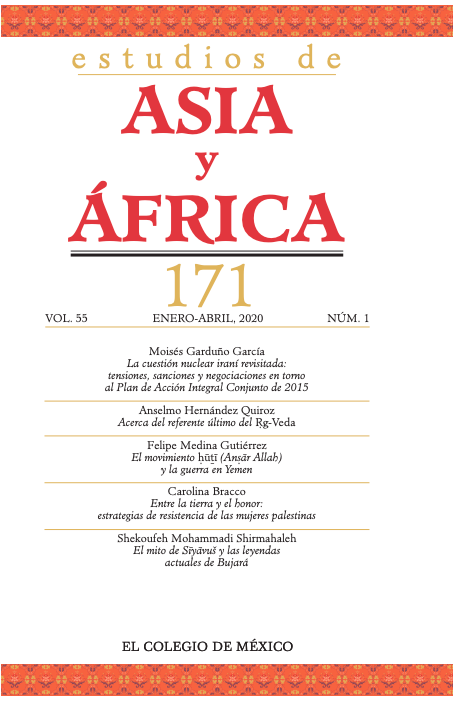Abstract
The most recent translations of the Ṛg-Veda consider this text as an exemplary liturgical poem or religious literature. However, it does not clearly discuss the parameters with which it is classified as being religious. This raises an important question once again: Is the Ṛg-Veda a religious text? Is it connected to some kind of religion? This paper researches the issue of the last reference as expressed in the Ṛg-Veda, referring to the existence of homogenously distributed passages both of textual determination and indetermination. Therefore, given the impossibility of a rigorous discussion of complete determination and indetermination, the final reference described is not defined. For that reason, I consider that the most ancient Vedic thought—as confirmed in the Ṛg-Veda—differs from both religious and philosophical thought, as these remain defined by the concepts of “God” and “principle”. In contrast, the author proposes an approach to the most ancient Vedic thought as a model of initiatory poetry.
References
Balagangadhara, S. N. (1994). The heathen in his blindness: Asia, the West, and the dynamic of religion. Leiden: Brill. https://doi. org/10.1163/157006898X00088
Geldner, K. F. (1951). Der Rig-Veda. Aus dem Sanskrit ins deutsche Übersetzt un mit einem laufenden Kommenar versehen (Vol. 1). Cambridge, MA: Harvard University Press.
Ghose, A. (1971). The secret of the Veda. Pondicherry: Sri Aurobindo Ashram.
Jamison, S. W. y Brereton, J. P. (Trads.) (2014). The Rig Veda: The earliest religious poetry of India (Vol. 1). Nueva York, NY: Oxford University Press.
Johnson, W. (1980). Poetry and speculation of the Ṛg Veda. Berkeley, CA: University of California Press.
Keith, A. B. (1925). The Religion and philosophy of the Veda and Upanishads (2 vols.). Cambridge, MA: Harvard University.
Kunhan Raja, C. (Trad.) (1956). Asya Vāmasya Hymn. (The Riddle of the Universe): Rigveda 1.164. Madras: Ganesh & Co.
Macdonell, A. A. (1917). Excerpts from: A Vedic reader. For students. Recuperado de http://www.sacred-texts.com/hin/vedaread.htm
Masuzawa, T. (2005). The invention of world religions or, how European universalism was preserved in the language of pluralism. Chicago, IL: University of Chicago Press.
Moreland, W. H. y Chatterjee, A. Ch. (1958). A short history of India. Londres: Longmans.
Müller, F. M. (2000). India: What can it teach us? Nueva Delhi: Penguin Books.
Oberlies, T. (1998). Die Religion des Ṛgveda: Erster Teil: Das religiöse System des Rμgveda. Wien: Institut für Indologie der Universität Wien.
Pincott, F. (1887). The first mandala of the Ṛig Veda. Journal of the Royal Asiatic Society, 19(4), 598-624. https://dx.doi.org/10.1017/ S0035869X00019717
Renou, L. (Trad.) (1956). Hymnes spéculatifs du Véda. París: Gallimard.
Spess, D. L. (2000). Soma: The divine hallucinogen. Rochester, VT: Park Street Press.
Thomson, K. (2009). A still undeciphered text: How the scientific approach to the Rigveda would open up Indo-European studies. Journal of Indo-European Studies, 37(1-2), 1-72.
Van Nooten, B. A. y Holland, G. B. (Eds.) (1994). Rig Veda: A metrically restored text, with an introduction and notes. Cambridge, MA: Harvard University Press.
Witzel, M. (2004), The Rμgvedic religious system and its Central Asian and Hindukush Antecedents. En A. Griffiths y J. E. M. Houben (Eds.), The Vedas: Texts, language and ritual. Proceedings of the Third International Vedic Workshop, Leiden 2002 (pp. 581- 636). Groninga: Egbert Forsten.
Witzel, M. et al. (Trads.) (2007). Rig-Veda: das heilige Wissen. Erster und zweiter Liederkreis. Frankfort del Meno: Weltreligionen.
This work is licensed under a Creative Commons Attribution-NonCommercial-NoDerivatives 4.0 International License
Copyright 2022 Estudios de Asia y África



